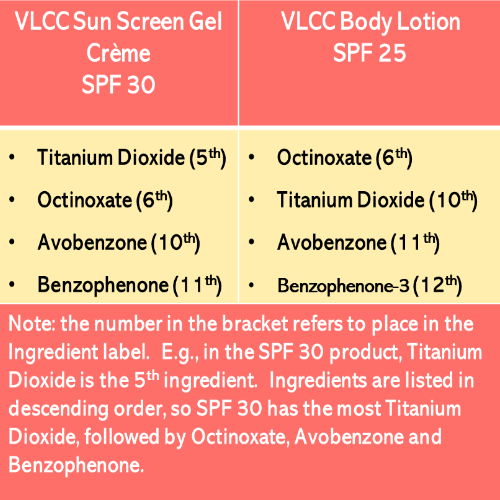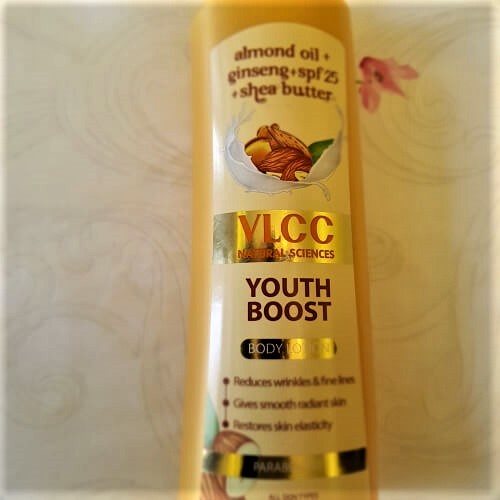My view: Give it a miss
We have done it. This is the final piece in the VLCC sunscreen universe (from me…for now). Its exciting – the enticing promise of an SPF 25 product, not quite an SPF 20 or an SPF 30… If you’d like an in-depth analysis on the filters in this product, then please read this blog (SPF 30).
Has anything changed from SPF 30 to SPF 25
Honestly, its a bit like asking if a leopard has changed its spots. Here are both products’ UV filters alongside each other:

The UVB filter is mainly Octinoxate which (kind of) justifies the SPF 25 rating.
It’s the policy of this blog not to suggest Indians use anything below SPF 30. I would be fixated with this were it not for the UVA filters.
The UVA filter debacle
I will be generous and assume that VLCC have chosen Avobenzone as its primary UVA filter. This is a gold standard UVA filter and this product uses Benzophenone-3 to stabilise this notoriously unstable UVA filter. Usually you’ll find multiple stabilisers in decent products, but let’s forgive VLCC for the moment.
Such generosity I hear you say. Well, the product is much like Rahul Gandhi’s Prime Ministerial campaigns, as it stabs itself in the foot and the head by adding Octinoxate and Titanium Dioxide. Both Octinoxate and Titanium Dioxide make Avobenzone photounstable. Also, Octinoxate becomes unstable in this combination.
Therefore, having Avobenzone adds nothing to this product.
Click on LINK for more information.
And then there was one more reason to come back from the dead
Yup, this product contains Oxybenzone, an endocrine disruptor (read this blog) and Butylated Hydroxytoulene (BHT). Both are harmful chemicals that you can do without.
BHT
BHT are preservatives and this is their problem:
Limited evidence suggests that high doses of BHT may mimic estrogen [6], the primary female sex hormone, and prevent expression of male sex hormones [7], resulting in adverse reproductive affects. prevent expression of male sex hormones [7], resulting in adverse reproductive affects.
David Suzuki website. [6]. Wada, H. et al., “In vitro estrogenicity of resin composites,” Journal of Dental Research 83, no. 3 (March 2004): 222-6. [7]. Schrader, TJ and GM Cooke, “Examination of selected food additives and organochlorine food contaminants for androgenic activity in vitro,” Toxicological Sciences 53, no. 2 (February 2000): 278-88.
In closing
I would be extremely disappointed if you ever bought any of the VLCC products that I have rejected. If I haven’t been able to persuade you of their demerits, then my blog is failing you.
Please drop me a line at email@happyskindays.com and I will help you find a better product.
Till next time – Ciao.
Notes: Sources and Uses and other goodies
INCI names of Ingredients
These are the proper names of UV filters:
- Avobenzone: Butyl Methoxydibenzoylmethane
- Octinoxate: Ethylhexyl Methoxycinnamate
- Oxybenzone: Benzophenone-3
See also: Top 5 sunscreen recommendations, Do You Understand The Gibberish On Sunscreen Labels? Myths About Sun-Protection
Sources and uses:
Product label details: Batch no: B18104 , Mfd: 12-18, Use Before: 12- 21, Manufacturing Licence No: 9/C/UA/2009
US20170326062A1 (US Patent application pending),
US9956163B2 (Having previously been published, pre-grant publication);
Ceresole, R., Y.K. Han, M.A. Rosasco, et al., “Drug-Excipient Compatibility Studies in Binary Mixtures of Avobenzone,” Journal of Cosmetic Science, vol. 64(5), pp. 317-328, 2013;
Nash, J.F., and P.R. Tanner, “Relevance of UV Filter/Sunscreen Product Photostability to Human Safety,” Photodermatology, Photoimmunology and Photomedicine, vol. 30(2-3), pp. 88-95, 2014;
Wendy E Roberts, Lily I Jiang, and James H Herndon, Jr, “Facial primer provides immediate and long-term improvements in mild-to-moderate facial hyperpigmentation and fine lines associated with photoaging” Clin Cosmet Investig Dermatol. 2015; 8: 471–477.
